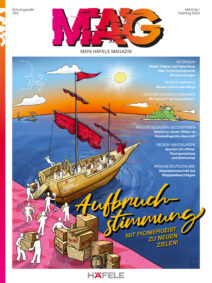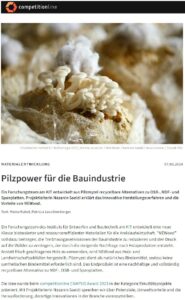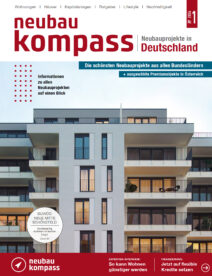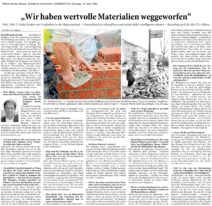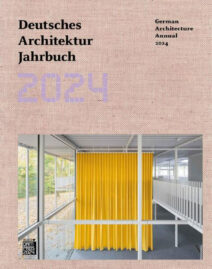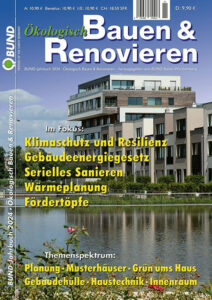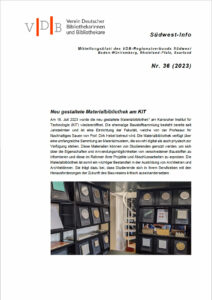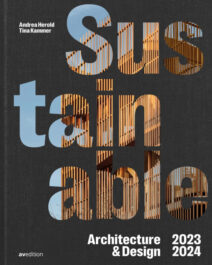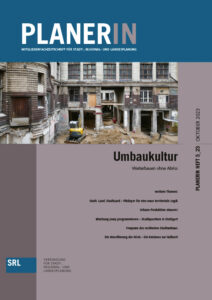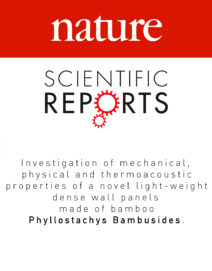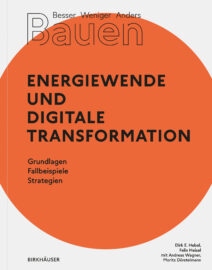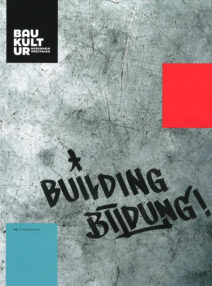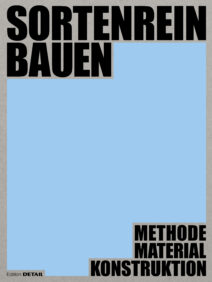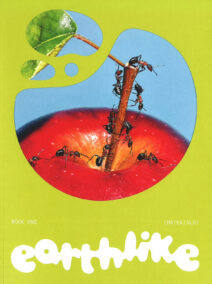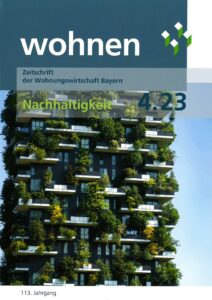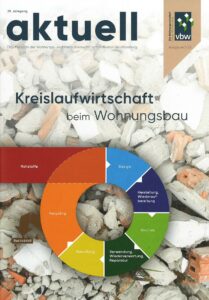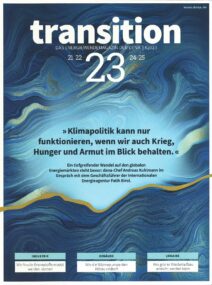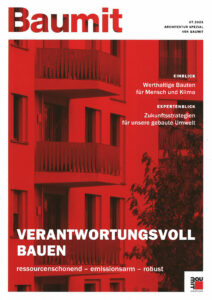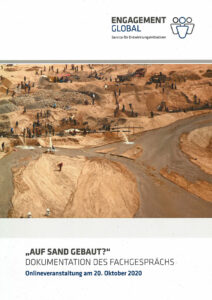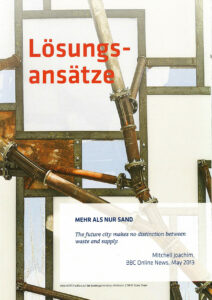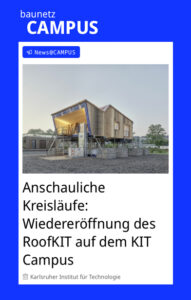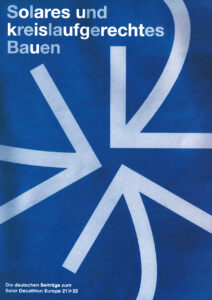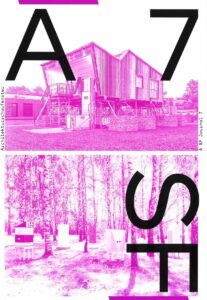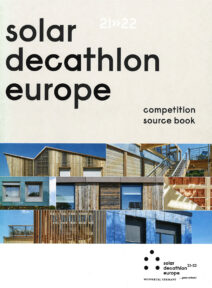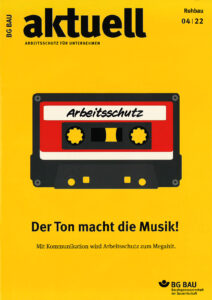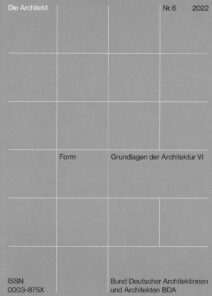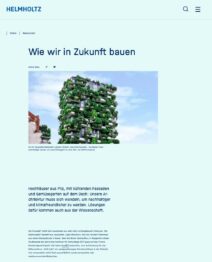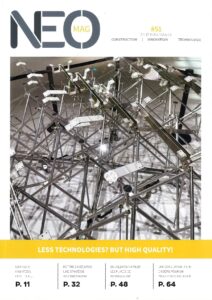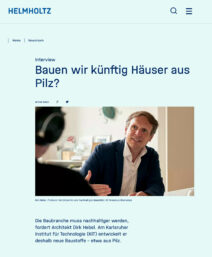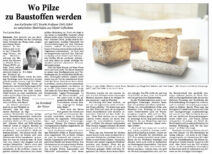Prof. Dirk E. Hebel
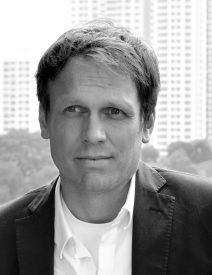
Master of Architecture, ETH Zurich, 1998
Master of Architecture, Princeton University, 2000
Contact: dirk.hebel@kit.edu
Professor of Sustainable Construction KIT Karlsruhe 2017-present / Dean of the Faculty of Architecture KIT 2019-present / Principal Investigator at FCL Singapore 2012-2020 / Assistant Professor of Architecture and Construction ETH Zurich 2012-2017 / Founding Scientific Director of the Ethiopian Institute of Architecture, Building Construction and City Development EiABC 2009-2012 / Visiting Critic Cornell University 2017 / Guest Lecturer Princeton University, USA, 2008 / Guest Professor Syracuse University, USA, 2008 / Visiting Lecturer, American University of Sharjah, UAE, 2005 and 2006
Dirk E. Hebel is Professor of Sustainable Construction and the Dean of the Department of Architecture at the Karlsruhe Institute of Technology, KIT, Germany. Prior to that, he was Assistant Professor of Architecture and Construction at ETH Zürich, Switzerland and a Principal Investigator at the Future Cities Laboratory in Singapore. He was also the Founding Scientific Director of the Ethiopian Institute of Architecture, Building Construction and City Development in Addis Ababa, Ethiopia. He was as well Guest Professor at Syracuse University, Guest Lecturer at Princeton University, and Hans and Roger Strauch Visiting Critic at Cornell University.
He is the author of numerous book publications, lately Sortenrein Bauen (2023, DETAIL with Ludwig Wappner et. al.), Clean Energy Transition and Digital Transformation (2023, Birkhäuser with Felix Heisel, Andreas Wagner and Moritz Dörstelmann), Circular Construction and Circular Economy (2022, Birkhäuser with Felix Heisel and Ken Webster), Urban Mining und Kreislaufgerechtes Bauen (Urban Mining and Circular Construction) (2021, Fraunhofer Verlag, with Felix Heisel), Addis Ababa: A Manifesto on African Progress (2018, Ruby Press, with Felix Heisel, Marta Wisniewska and Sophie Nash), Cultivated Building Materials (2017, Birkhäuser, with Felix Heisel), SUDU – The Sustainable Urban Dwelling Unit (2015, Ruby Press, with Melakeselam Moges and Zara Gray), Building from Waste: Recovered Materials in Architecture and Construction (2014, Birkhäuser, with Marta H. Wisniewska and Felix Heisel), and Cities of Change: Addis Ababa (2009/2016 (2nd revised edition), Birkhäuser, with Marc Angélil). In 2008, he published the book Deviations (2008, Birkhäuser, with Marc Angélil), an experiment in architectural design pedagogy and in 2005 Bathroom Unplugged (2005, Birkhäuser, with Jörg Stollmann).
Currently, Dirk E. Hebel is co-founder and partner of 2hs Architekten und Ingenieur PartGmbB Hebel Heisel Schlesier, practicing architecture with a focus on resource-respectful construction methods and materials. He was also one of the founding partners of INSTANT Architects (2002-2008). Latest building projects include the winning project of Solar Decathlon 21/22 RoofKIT (2022, 2hs (Prof. Karsten Schlesier) with KIT Faculty of Architecture), the Mehr.Wert Pavillion for the BUGA Heilbronn (2019, 2hs, Simon Sommer, Lisa Krämer, Philipp Staab, Sophie Welter und Katna Wiese); the UMAR (Urban Mining and Recycling) project in Zürich for EMPA Dübendorf (2018 ,together with Werner Sobek and Felix Heisel); MycoTree, a project for the Seoul Architecture Biennale (2017, with Felix Heisel, Karsten Schlesier, Nazanin Saeidi and Alireza Javadian in cooperation with the Block Research Group Zürich, Philippe Block, Matthias Rippmann and Juney Lee); a school house complex for 1200 students in Cambodia for the NGO Smiling Gecko (2016-2018, together with Lisa Devenoge, Lorine Grossenbacher, Franziska Matt, Elizabeth Müller, Alina Wyder, and Marcel Aubert), the New York NoWaste Vault for IDEAS CITIES (2015, with Felix Heisel, Samuel P. Smith, Nicholas Ashby, Ruben Bernegger in cooperation with the Block Research Group Zürich, Philippe Block, Tomas Mendez Echenagucia); DISCOVERIES, an exhibition for the Foundation Lindau Nobel Prize Winners with Tobias Klauser; ON_AIR, an installation for KunstWerke Berlin; the award-winning project UNITED_BOTTLE; and HausBlick Düsseldorf, all with Jörg Stollmann, INSANT Architects, all 2002-2008.
His work has been shown in numerous exhibitions worldwide, lately in Plastic: Remaking our world, Vitra Design Museum Weil am Rhein (2022), Environmental Hangover by Pedro Wirz (with Nazanin Saeidi and Alireza Javadian), Kunsthalle Basel (2022), SORGE UM DEN BESTAND, BDA, Berlin and others, (2020/21), CRITICAL ZONES, ZKM Karlsruhe (2020), FUTURIUM Berlin (2019), the Beazly-Design of the Year Exhibition (2018), The Design Museum London (2018), Fibre Fixed: Composites in Design Exhibition, Design Museum Gent (2018), ORGATEC, Köln (2018), Super Materials London (2017), UK, the Design Fair Cologne (2017), Köln, the Seoul Architecture Biennale (2017), South Korea, or the Venice Architecture Biennale (2021/2018/2016), Italy.
As Faculty Advisor (together with Prof. Andreas Wagner), he won the Solar Decathlon Competition 21/22 as part of the KIT RoofKIT team (Regina Gebauer and Nicolas Carbonare), he received the Green Solution Award 2021, one of the German Material Awards 2019, two Innovation Awards “Bauhaus 100 – Prototyping the Future” organized by the Federal German Government and German Industry in 2019, the New York Van Alen Institute Fellowship Award, the Red Dot Design Award for Best Conceptual Design, the SMART Innovation Grant Singapore, the JEC Asia Innovation Award, a ZUMTOBEL GROUP Award, the Suzanne Underwood Award for Best Design, and the LANXESS Award Singapore. He was also awarded the KIT Best Teaching Award, KIT Faculty of Architecture, 2019.
Dr. Nazanin Saeidi
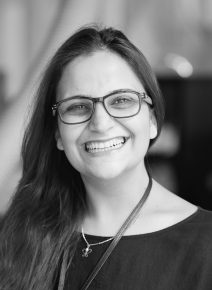
PhD, NTU Singapore, 2013
Master of Bioengineering, NTU Singapore, 2013
Contact: nazanin.saeidi@kit.edu
Senior researcher and Head of Research at the Chair of Sustainable Construction KIT Karlsruhe and Co-Principal Investigator at the Future Cities Laboratory of Singapore-ETH Centre, 2020 – present / Post-doc researcher at the Alternative Construction Materials Group at FCL Singapore, 2017-2020 / Post-doc researcher at the Department of Civil and Environmental Engineering at National University of Singapore NUS, 2014-2017 / Post-doc research fellow at the Singapore Membrane Technology Center, 2013-2014
Dr. Nazanin Saeidi is currently a senior researcher and Head of Research at the Chair of Sustainable Construction at the Karlsruhe Institute of Technology KIT. She is also a Co-Principal Investigator of the Urban-Biocycle Project at the Future Cities Laboratory of Singapore-ETH Centre of Sustainability in Singapore. She is focusing on upcycling plant-based waste products and turning them to ecological products with the aid of fungal mycelia as a natural binder.
In her PhD at Nanyang Technological University in Singapore she worked on “Engineering microbes to sense and eradicate a human pathogen”. Her thesis work was impressive enough to get a publication space under Molecular Systems Biology (MSB) from Nature publishing Group, 2011, it was then featured in more than 70 public and academic media.
In 2013, she was appointed as a postdoctoral research fellow at the Singapore Membrane Technology Centre where she was working on “development of improved strategies to control Biofouling of membranes in water industry”. In 2014, she joined the department of Civil and Environmental Engineering at National University of Singapore to persuade a new research experience where she was focusing on “Emerging microbial contaminants of concern in tropical urban catchments” and “The effect of diverse land use on the geospatial distribution of Emerging microbial contaminants of concern in tropical environments”.
During her academic life, she has received several awards and recognition from different conferences. Her recent distinguished success is to be named as one of the 20 emerging innovators in Asia Pacific by MIT Technology Review in 2020 for her work on sustainable construction materials.
Dr. Alireza Javadian
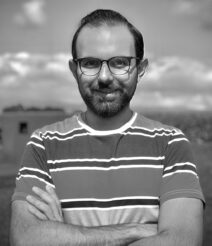
PhD, ETH Zürich, 2017
Master of Civil Engineering, NTU Singapore, 2010
Master of Civil Engineering, NUS Singapore, 2011
MBA, ARU Oxford, UK, 2012
Contact: alireza.javadian@kit.edu
Senior researcher and Head of Research at the Chair of Sustainable Construction KIT Karlsruhe and Co-Principal Investigator at the Future Cities Laboratory of Singapore-ETH Centre, 2020 – present / Post-doc researcher at the Alternative Construction Materials Group at FCL Singapore, 2012-2020 / Civil Engineer at ‘Beca Carter Hollings and Ferner’ Singapore, 2010-2012 / Researcher at NUS Singapore, 2009-2010 / A*STAR Singapore scholarship recipient at NTU Singapore, 2007-2009
Dr. Alireza Javadian is currently a senior researcher and Head of Research at the Chair of Sustainable Construction at the Karlsruhe Institute of Technology KIT. He is also a Co-Principal Investigator of the Urban-Biocycle Project at the Future Cities Laboratory of Singapore-ETH Centre of Sustainability in Singapore. Alireza Javadian is currently working on the development of sustainable building materials made from renewable resources. His work on engineered bamboo and mycelium-bound building elements explore the idea of a new class of biological driven constrution materials embeded within a true circular economy.
He has received the distinguished award by Singapore government for his work on development of Organic Fiber Composite Materials for Construction on the 50th anniversary of Singapore’ independence in 2015. Furthermore, he won the SMART Innovation Grant Singapore, the SAWIRIS Grant from ETH Zürich, a Swiss KTI project fund from Swiss National Research Foundation, and a ZUMTOBEL GROUP Award together with the research team in Singapore and Zürich. He has also co-founded the Spin-off company Widuz to commercialize high performance bamboo composite materials.
Sandra Böhm
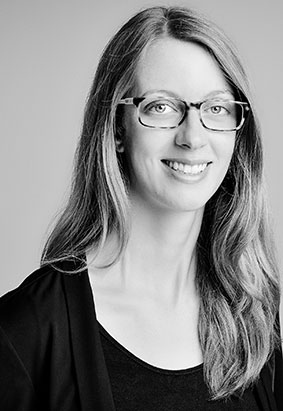
Dipl. Designer, Product Design, University of Art and Design Karlsruhe, 2014
Contact: sandra.boehm@kit.edu
Doctoral Student at the Chair of Sustainable Construction KIT Karlsruhe 2021 – present / Lecturer and Researcher at the Chair of Sustainable Construction KIT Karlsruhe 2017 – present / Freelance Work as Designer 2015-2020 / Designer at Fachwerk Marketing GmbH 2016-2017 / founding Sandra Böhm Produktdesign 2015 / Assistant at Jerszy Seymour Designworkshop Berlin 2013 / Assistant at Studio Judith Seng und Alex Valder Berlin 2013
Sandra Böhm is a lecturer and researcher at the Chair of Sustainable Construction at KIT Karlsruhe. She studied product design at the Karlsruhe University of Arts and Design, where she graduated in 2014. Her diploma thesis Komposita dealt with the recycling of biogenic waste materials and was presented at numerous exhibitions and trade fairs. In her doctoral thesis at KIT, she is researching the recycling of biogenic residues within the construction industry with a focus on bio-based insulation materials. She recently presented her research in a reviewed paper and talk at the Real Corp 2023 – let it grow, let us plan, let it grow conference in Ljubljana, Slovenia. Together with Elena Boerman, she is responsible for the KIT Material Library and its continuous development. The KIT Material Library focuses on circular architecture, as well es on sustainable and future-oriented building materials. In addition, she organizes and holds the material lecture series in the 1st semester and regularly organizes practice-oriented research seminars for master students.
Sandra Böhm published some articles and papers, recently the reviewed paper The Potential of Bio-Based Insulation Materials for Healthy Living Spaces and Sustainable Architecture (CORP – Competence Center of Urban and Regional Planning, 2023. URL: https://conference.corp.at/archive/CORP2023_90.pdf, doi:10.48494/REALCORP2023.3090) and the book chapter Der ästhetische Reiz der urbanen Mine (Heisel, Felix, und Dirk E. Hebel (Hrsg.). Urban Mining und kreislaufgerechtes Bauen. Die Stadt als Rohstofflager. Fraunhofer IRB Verlag, 2021).
Before taking her position at the KIT, she developed her own projects dealing with furniture design and experimental work on materials and material development. During her studies at the University of Art and Design Karlsruhe she also worked as an assistant at Jerszy Seymour Design Workshop Berlin and at Studio Judith Seng und Alex Valder in Berlin.
Sandra Böhm has already presented her projects in numerous exhibitions. Especially her furniture series Prei, which is made of recycled paper, has already been attracted by a number of exhibitions, such as in Circular Thinking “Innovation of Interior” – From Upcycling to Biofabrication, interzum, KölnMesse (2017), Es war einmal…, Passagen – Interior Design Week Köln, Galerie Kunst&So (2017), Have a seat, Saarländisches Künstlerhaus Saarbrücken (2016), Eunique, Messe Karlsruhe (2015), Salone Internazionale del Mobile, Milan, kkaarrlls (2012, 2013, 2014).
Manuel Rausch
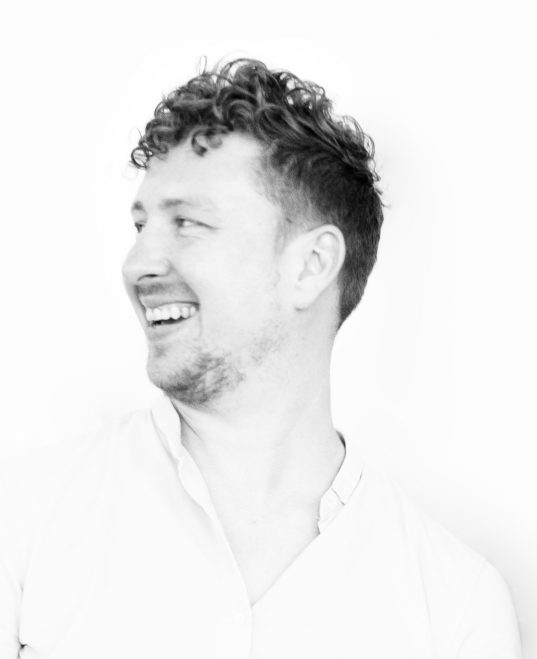
M.A. Arch Architect, ABK Stuttgart 2012
Contact: manuel.rausch@kit.edu
Teaching Assistant and Researcher at the Chair of Sustainable Construction KIT Karlsruhe 2017 – present / Founder of STUDIO-MRA, Stuttgart 2018 – present/ Leading Architect – Head of Design, Steimle Architekten BDA, Stuttgart 2012 – 2018 / M.A. Architecture, Akademie der bildenden Künste, Stuttgart 2006-2012 / Design and architecture Model Carpenter and Prototype Constructor 2001-2005
Manuel Rausch currently works as a teaching assistant and researcher at the Chair of Sustainable Construction at KIT Karlsruhe. Simultaneously he is founder of the office STUDIO-MRA Stuttgart, practicing architecture. Before that he worked as a Model Carpenter and Prototype Constructor with the focus on design and architecture Models. He recently authred following competition with his office STUDIO-MRA: 2024 [3.Prize] Neue Mitte Neuhausen, Offenberg (Bay) – DE, 03/2024, [3.Prize] Neubau Verwaltungsgebäude Amt, Barnim – DE, 02/2024, [1.Prize] Neubau Kita Pfiffikus, Wettenberg – DE, 02/2024; 2023 [winner/Preisgruppe] „Modellprojekt zur Wohnraumentwicklung“, Pfettenstraße Landsberg am Lech – DE, 06/2023; [Ein 3.Preis] „Neugestaltung Ortsmitte“, Gemeinde Schutterwald – DE, 04/2023; 2022 [2.Preis] „Freizeit Bernau“, Bernau im Schwarzwald – DE, 11/2022; [Ein 3.Preis] „Zukunft der Bäderlandschaft“, Schwelm – DE, 08/2022; [Ein 2.Preis] Umweltbildungszentrum Blauer See – DE, 06/2022; [1.Preis] Bahnhofsareal Markt Holzkirchen – DE, 04/2022; 2021 [3.Preis] Neubau der Handwerkskammer Koblenz – DE, 03/2021; [1.Preis] Zincoli-Kamin, Stolberg – DE, 02/2021; 2018 Neubau der Sekundarschule in Bielefeld – DE, 05/2018, [3rd Prize]; Neubau Rathaus Delbrück -DE, 11/2017, [1st Prize] (with Alhäuser Architekten)
He also participated in the following successful competitions with Steimle Architekten: Besucherzentrum Bauhaus Denkmal (UNESCO Weltkulturerbe) Bernau bei Berlin – DE, 11/2017 [1st Prize]; Wohn- und Geschäftshaus, Berlin -DE, 02/2017 [1st Prize] ; Half-Long Charles, Ludwigsburg -DE, 11/2016 [1st Prize] ; Rettungs-Leitstelle der Feuerwehr, Fulda – DE, 04/2016 [1st Prize] ; Neubau Feuerwehrhaus, Germersheim – DE, 09/2015 [One 1st Prize Awarding of contract]; Landratsamt-Erweiterung, Bad Kissingen, Bayern – DE, 07/2015 [1st Prize]; Neubau Rathaus / Neugestaltung San-Biagio-Platani-Platz, Remchingen – DE, 04/2015 [1st Prize]; Wohnen am Nordwall, Stadthagen – DE, 03/2015 [1st Prize]; Recent built projects include: 2016 E20 house, DE-72124 Pliezhausen in collaboration with Steimle Architekten, 2014 S3 city villa, DE-72074 Tübingen in collaboration with Steimle Architekten
The team of Steimle Architekten was awarded the 10/2017 Hugo Häring Auszeichnung, BDA 2017, E20 house, Pliezhausen – DE, 10/2017 Hugo Häring Auszeichnung, BDA 2017, S3 city villa, Tübingen – DE, 09/2017 Architekturpreis Beton, E20 house, Pliezhausen – DE, 09/2017 Buchpublikation Häuser des Jahres, E20 house, Pliezhausen – DE, 09/2017 Special Mention „das Goldene Haus“, E20 house, Pliezhausen – DE, 07/2017 best architects 18 Gold, E20 house, Pliezhausen – DE, 07/2017 Award “Beispielhaftes Bauen”, S3 city villa, Tübingen – DE
Katharina Blümke

M.Sc of Architecture, KIT, Karlsruhe, 2019
Contact: katharina.bluemke@kit.edu
Teaching Assistant and Researcher at the Chair of Sustainable Construction KIT Karlsruhe 2019 – present / Junior Architect at Falk Schneemann Architektur, Karlsruhe 2020 – present / M.Sc. Architecture, Karlsruher Institut für Technologie, Karlsruhe 2017-2019 / Milla Architekten, Karlsruhe 2017-2018 / Exchange, Escola da Cidade, São Paulo 2015 / KSV Architekten, Berlin 2014 / B.A. Architecture, Hochschule für Technik, Wirtschaft und Gestaltung, Konstanz 2012-2017
Katharina Blümke is currently working as a teaching assistant at the Chair of Sustainable Construction at KIT Karlsruhe. Aside from that she is employed as a Junior Architect at Falk Schneemann Architektur, Karlsruhe where she is working on a roof extension which will be constructed in a circular construction method and contains neither adhesives nor other composite materials.
She holds a Master of Science in Architecture from the Karlsruhe Institute for Technology (KIT), and studied alongside the Karlsruhe Institute for Technology, at Escola da Cidade in São Paulo and at the HTWG Konstanz. While studying in Konstanz, she proactively designed and built the student cafe „Bohnenschrank“ together with two fellow students. During her studies she worked in various architectural practices in Germany, including Krüger Schuberth Vandreike in Berlin and Milla Architekten in Karlsruhe.
Katharina Blümke has been dealing with the topic of urban mining since her participation in the Urban Mining Student Award 2018/19, where she won recognition. For her master thesis „Roter Ochse – the rehabilitation of a architecture“ she was awarded the Weinbrenner Prize , exploring the reuse of reconstructed materials on site.
Hanna Hoss
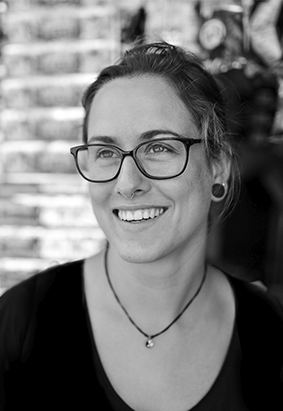
M.Sc of Architecture, KIT, Karlsruhe, 2020
Location: Karlsruhe
Contact: hanna.hoss@kit.edu
Teaching Assistant and Researcher at the Chair of Sustainable Construction KIT Karlsruhe 2020 – present / Junior Architect (AiP) at Löffler_Schmeling Architekten, Karlsruhe 2020 – present / Student Assistant at the Chair of Sustainable Construction KIT Karlsruhe 2020 / M.Sc. Architecture, Karlsruher Institut für Technologie, Karlsruhe 2017-2020 / archis Architekten + Ingenieure, Karlsruhe 2019-2020 / hotz + Architekten, Freiburg, 2017 / B.Sc. Architecture, KIT, Karlsruhe, 2013-2016
Hanna Hoss is currently working as a teaching assistant at the Chair of Sustainable Construction at KIT Karlsruhe. At the same time she is Junior Architect at Löffler_Schmeling Architekten, an office in Karlsruhe with its main focus on climate fair architecture.
She holds a Master and Bachelor of Science in Architecture from the Karlsruhe Institute for Technology (KIT). For her master thesis „Pro Humla – Birthing House in Western Nepal“ she was nominated for the BDA-SARP-AWARD 2020 and won recognition of the Friedrich-Weinbrenner-Prize 2020. Asking herself how to improve the situation of women menstruating and giving birth in Western Nepal, she analysed precisely which terms and conditions are dominating the construction site in the high mountains of the Himalayas. Those results lead to her design of a birthing house.
Elena Boerman
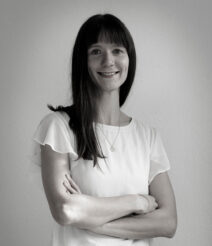
M.Sc of Architecture, KIT, Karlsruhe, 2021
Location: Karlsruhe
Contact: elena.boerman@kit.edu
Teaching Assistant and Researcher at the Chair of Sustainable Construction KIT Karlsruhe 2021 – present / Student Assistant at the Chair of Sustainable Construction KIT Karlsruhe 2020-2021 / M.Sc. Architecture, KIT, Karlsruhe 2018-2021 / AAg LoebnerSchäferWeber Freie Architekten BDA, Heidelberg, 2018-2021 / Schenk & Fleischhaker Architekten, Hamburg, 2017-2018 / B.Sc. Architecture, KIT, Karlsruhe, 2014-2017
Elena Boerman is currently working as a teaching assistant and researcher at the Chair of Sustainable Construction at KIT Karlsruhe. She holds a Master and Bachelor of Science in Architecture from the Karlsruhe Institute for Technology (KIT).
In her master’s thesis, she dealt with the urban spaces and architectures of post-war modernism and their contemporary and sustainable transformation. She showed both urban planning and architectural strategies for making the treatment of the existing the starting point for the architecture of tomorrow. For her master’s thesis with the title „The Value of an Architecture of Permanence – The Climate and Resource Appropriate Transformation of the Architectural Heritage of Post War Modernism“ she won recognition of the Friedrich-Weinbrenner-Prize 2021.
Daniela Schneider
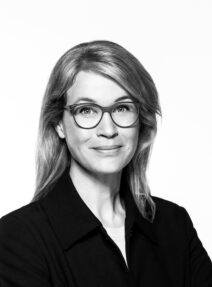
M. Sc. of Architecture and Environment, University of Applied Sciences Wismar, 2012
Dipl.-Ing. (FH) Architecture, University of Applied Sciences Stuttgart, 2008
Location: Karlsruhe
Contact: daniela.schneider@partner.kit.edu
Researcher at the Chair of Sustainable Construction KIT Karlsruhe 2020 – present / Lecturer at University of Applied Sciences Stuttgart, 2017-2020 / Team Lead at EPEA GmbH – Part of Drees & Sommer, Stuttgart, 2019 – present / Project Partner at Drees & Sommer ABT, Stuttgart, 2016-2019 / Project Engineer, Technology Center Sustainable Construction at Ed. Züblin AG, Stuttgart, 2012-2016 / Site Manager and Project Manager at BAM Deutschland AG, Stuttgart, 2008-2012
Daniela Schneider is currently a PhD student at the Chair of Sustainable Construction at KIT Karlsruhe. Her research activities focus on the design of circular constructions and circular joining techniques. She is examining the question which impact have joining techniques on the circularity of building component designs.
She lectures at the WINGS Wismar in the study course architecture and environment with a focus on circular design, planning and construction. Between 2017 and 2020, she was a lecturer at the University of Applied Sciences Stuttgart. Previously, she was a guest lecturer at the University of Applied Sciences in Konstanz and at the University of Stuttgart.
Currently she is a team leader of the Cradle to Cradle real estate team at EPEA GmbH in Stuttgart. She develops material and recycling concepts for circularity buildings. Her focus is on creating healthy and waste-free building structures. She practices architecture with a focus on minimalist, resource-friendly and separable building methods, materials and constructions.
Daniela Schneider is a member of the “Disassembling and Recyclability” expert group of the German Sustainable Building Council (DGNB). As an auditor for the German Sustainable Building Council, she accompanies building certifications and serves on the advisory board for circular construction.
Daniela Schneider is co-author of the publication “Urban Mining and Circular Construction” (2020, ed. Dirk E. Hebel and Felix Heisel). She elaborated keywords for circular construction for the Ecological Building Materials Dictionary (2018, ed. Wolfgang Linden and Iris Marquardt). A further publication is “Cradle to Cradle inspired smart cities” in the publication “Smart Cities” (2020, ed. Chirine Etezadzadeh).
Felix Heisel
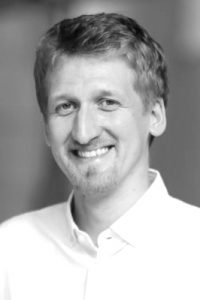
Dipl.-Ing. Architecture, UdK Berlin, 2010
Location: Cornell University, Ithaca, USA
Contact: felix.heisel@kit.edu
Assistant Professor of Architecture and Circular Construction, Cornell University 2020-present / Head of Research Chair of Sustainable Construction KIT Karlsruhe and FCL Singapore 2017-2019 / Harvard GSD Guest Lecturer 2018 / Hans and Roger Strauch Visiting Critic at Cornell University 2017 / Researcher at the Chair of Architecture and Construction ETH Zurich and FCL Singapore 2012-2017 / Lecturer and Coordinator of the 3rd Year Architecture Program at the Ethiopian Institute of Architecture, Building Construction and City Development 2011-2012 / Academic Assistant at Studio Arets, University of the Arts, Berlin 2010-2011 / Master Class Teaching Assistant at Berlage Institute Rotterdam 2010
Felix Heisel is currently Assistant Professor of Architecture and Circular Construction at Cornell University, USA as well as a Ph.D. candidate at the Professorship of Sustainable Construction at KIT Karlsruhe, Germany, where he acted as Head of Research between 2017 and 2019. In 2018, he was a Harvard GSD Guest Lecturer; in 2017, he was the Hans and Roger Strauch Visiting Critic at Cornell University, USA. Before that he acted as head of research at the Assistant Professorship of Architecture and Construction at the ETH Zurich, Switzerland. Preceding this position, he was the coordinator for the 3rd year architecture program at the Ethiopian Institute of Architecture, Building Construction and City Development (EiABC) in Addis Ababa, Ethiopia. For his involvement as a lecturer there, he received the ‘Best Teaching’ award in 2011.
He recently published Addis Ababa: A Manifesto on African Progress (2018, Ruby Press, with Dirk Hebel, Marta H. Wisniewska and Sophie Nash), Cultivated Building Materials: Industrialized Natural Resources for Architecture and Construction (2017, Birkhäuser, with Dirk E. Hebel), Lessons of Informality (2016, Birkhäuser, with Bisrat Kifle) as well as Building from Waste: Recovered Materials in Architecture and Construction (2014, Birkhäuser, with Dirk E. Hebel and Marta H. Wisniewska), and contributed articles to magazines and books such as The Material Book (2020, Ruby Press), IMMINENT COMMONS: Urban Questions for the Near Future (2017, eds. Alejandro Zaera-Polo, Hyungmin Pai, and urbanNext), a+u issues 448, 449, and 450 (2016), Cities of Change Addis Ababa, 2nd and Revised Edition (2016, eds. Marc Angelil and Dirk E. Hebel), or The Economy of Sustainable Construction (2013, Ruby Press). His interest in Ethiopia’s urban growth resulted in the making of the movie series _Spaces, a collection of six documentaries on space appropriation in Addis Ababa, started together with Bisrat Kifle in 2011.
Felix Heisel has won several awards and grants within the last years, such as two beyond bauhaus: prototyping the future awards (2019), a MaterialPREIS (2019), a JEC Asia Innovation Award (2016), a Ministry of Education (MOE) Innovation Grant Singapore (2014), a ZUMTOBEL GROUP Award (2014), a Swiss KTI project fund (2014), the SMART Innovation Grant Singapore (2013) or the Bauhaus.SOLAR Award (2012). He also contributed to several architectural competition entries, such as the 1st prize Sulzer Werk 1 Winterthur, Switzerland (2009, with Gigon/Guyer Architects); the 1st prize Bole Road Hotel Competition Addis Ababa, Ethiopia (2009, with Zegeye Cherenet Architects & Associates) and the 3rd prize Städel Museum Frankfurt, Germany (2008, with Gigon/Guyer Architects). Felix Heisel is co-founder and partner of 2hs Architekten und Ingenieur PartGmbB Hebel Heisel Schlesier and a registered member of the German Architectural Association AKBW, practicing architecture with a focus on resource-respectful construction and circular materials – resulting in projects such as the UMAR Urban Mining and Recycling Unit (2018) and the Mehr.WERT.Pavillon (2019).
Karsten Schlesier
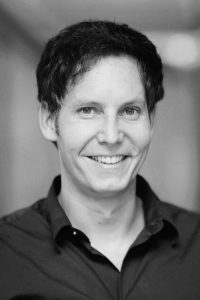
Dipl.-Ing. Civil Engineering, TH Karlsruhe, 1999
Location: Karlsruhe
Professor of Structural Design, HCU Hamburg, 2019-present / PhD candidate at the Chair of Sustainable Construction KIT Karlsruhe, 2017-present / Researcher at the Chair of Sustainable Construction KIT Karlsruhe and FCL Singapore 2017-2019 / Assoc. Professor at GUtech Oman 2014-2017 / Consultant to FCL Singapore 2012-2015 / Structural Engineer at M+W Ingenieurbüro 2012-2014 / Chair Holder of Structural Design EiABC 2009-2011 / Visiting Professor Addis Ababa University 2008-2011 / Research Associate KIT Karlsruhe 2003-2007 / Structural Engineer at Bollinger + Grohmann 2002-2003 / Structural Engineer at formTL 2000-2001
Karsten Schlesier currently holds the position of Guest Professor at the Hafen City University HCU, Hamburg, Germany. He is a PhD candidate at the Chair of Sustainable Construction KIT Karlsruhe. Before that, he worked as a researcher at the Chair of Sustainable Construction KIT Karlsruhe and the Future Cities Laboratory Singapore and as a Visiting Professor for Structural Design at the GUtech Oman. He graduated in Civil Engineering from Karlsruhe Institute of Technology (previously TH Karlsruhe) in 1999. Working for different renowned engineering offices, he specialized in the fields of lightweight, membrane and glass structures. His portfolio comprises various projects, among others the membrane and steel roof construction of Parkstad-Limburg-Stadium, the inflated and dynamic pavilion structure Nouvelle DestiNation for the Expo 02 in Switzerland, the suspended “take-off” object for BMW at Munich Airport and the hanging façade structure of the Audi Lounge building in Neckarsulm.
In 2003 Karsten Schlesier joined KIT Karlsruhe, working as a Research Associate at the Institute for Structural Design (Institut für Tragkonstruktionen). He played a key role in the implementation of several student design projects, realized as temporary pavilions on festival sites. Between 2008 and 2011 Karsten Schlesier joined Addis Ababa University as a Visiting Professor, holding the Chair of Structural Design together with his Ethiopian counterpart Wondimu Kassa at the Ethiopian Institute of Architecture, Building Construction and City Development as of 2009. There, he initiated tests and experimental designs for a new bamboo composite material used as an alternative high-strength building material. His research resulted in the commission for the official Southern Nations pavilion at the 2010 Ethiopian Cities Day in Awassa, which was realized as a design-to-build project with students of the EiABC and local craftsmen. Between 2014 and 2017 he worked as an Associate Professor for structural design and building construction at the German University of Technology in Oman. Together with Prof. Nikolaus Knebel he implemented the “building yard” on GUtech campus as a 1:1 experimental construction lab for research and education. Several student design projects made from local waste products and earth were built under his guidance.
His research activities are focused on non-standardized and alternative construction materials. During his academic career, he realized various prototypical structures from waste products and cultivated building materials, lately MycoTree, an experimental structure from mycelium for the Seoul Architecture Biennale 2017. In 2014, Karsten Schlesier received together with the bamboo research team in Singapore and Zürich an ZUMTOBEL GROUP Award.
Elke Siedentopp
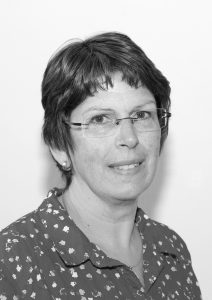
Bank Business Management Assistant, 1979
Location: Karlsruhe
Contact: elke.siedentopp@kit.edu
Secretary at the Chair of Sustainable Construction KIT Karlsruhe 2017-present / Secretary at the Institute for Building Design and Technology KIT Karlsruhe 1998 – 2017
Elke Siedentopp currently works as the secretary of the Professorship of Sustainable Construction at the Karlsruhe Institute of Technology. Previously, she has been employed by the Institute for Building Design and Technology at KIT and the former Technical University of Karlsruhe since 1998.
